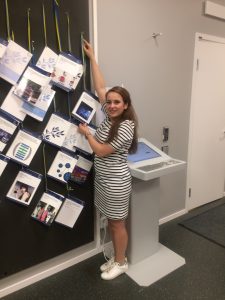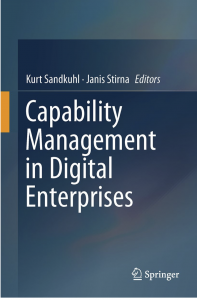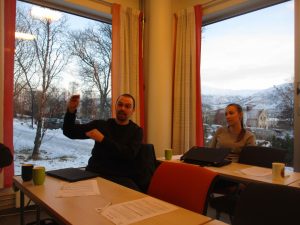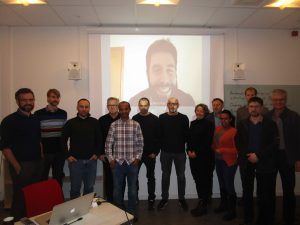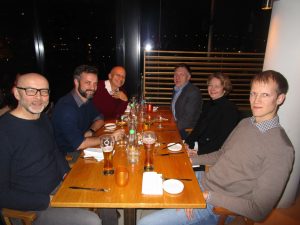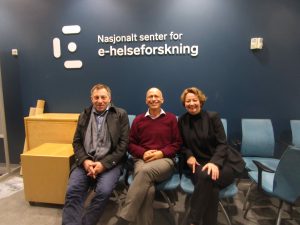On May 14, 2018, Parisa Aasi has nailed her PhD thesis at DSV. Parisa Aasi is a PhD student in IT Management and Governance group at DSV and her PhD defence will take place on June 4, 2018 at 13.00 in L50 at DSV. A copy of her PhD thesis entitled “Information Technology Governance: The Role of Organizational Culture and Structure” is available to be downloaded at the following link http://su.diva-portal.org/smash/get/diva2:1195170/FULLTEXT01.pdf
Papers accepted for publication in International Journal of IT/Business Alignment and Governance, and International Journal of Innovation in the Digital Economy
A paper written by Parisa Aasi, Lazar Rusu, Dorothy Leidner, Erik Perjons and Corrales Estrada Martha and entitled “What is the role of organizational culture in IT governance performance of collaborative virtual networks?” has been accepted for publication in International Journal of IT/Business Alignment and Governance, Vol. 9, Issue 1, IGI Global, 2018.
A paper written by Filip Johansson and Lazar Rusu and entitled “Barriers to Agility in a Large Company’s IT Organization” has been accepted for publication in International Journal of Innovation in the Digital Economy, Vol. 10, Issue 1, IGI Global, 2019.
A paper written by Gideon Mekonnen Jonathan and Lazar Rusu and entitled “eGovernment Adoption Determinants from Citizens’ Perspective: A Systematic Literature Review” has been accepted for publication in International Journal of Innovation in the Digital Economy, Vol. 10, Issue 1, IGI Global, 2019.
New book on capability management
A new book on capability management resulting from the work of the CaaS project will be available in June.
Sandkuhl K., Stirna J. (Eds.) Capability Management in Digital Enterprises, Springer, 2018
Job: PhD student in Computer and Systems Sciences with focus on Deep Learning for Natural Language Processing of Healthcare Data
Deep learning based on various neural network architectures has seen tremendous success in recent years, substantially outperforming alternative learning approaches in fields such as natural language processing. By learning abstract representations through multiple processing layers, the learning task can be simplified while removing the need for carefully handcrafted features. Deep learning hence provides an effective paradigm for obtaining end-to-end learning models from complex data, such as the vast amounts of longitudinal and heterogeneous data that are stored in electronic health records. Learning general-purpose representations of patients can be useful for modeling patient trajectories and disease progression, supporting early prediction and detection of adverse events, such as healthcare-associated infections or adverse drug effects. There are numerous open research questions w.r.t. deep learning from healthcare data, including (i) effectively learning from small amounts of (labeled) data through, e.g., unsupervised pre-training, (ii) modeling the temporality of clinical events, and (iii) creating interpretable models that can be understood by clinical decision makers.
The PhD project involves designing novel deep learning architectures that address these challenges in order to make better use of heterogeneous healthcare data, in particular free-text clinical notes, for ultimately supporting healthcare by improving patient safety and reducing healthcare costs. In HEALTH BANK, we have access to eight years of specialized healthcare data from Karolinska University Hospital and are currently in the process of also obtaining primary care data, thereby allowing patients to be followed throughout the healthcare system.
Visiting Researcher from Pontifical Catholic University of Rio Grande do Sul, Porto Alegre, Brazil
Information Systems unit at DSV will been the host for one month (January 22-February 22, 2018) of Odirlei Antonio Magnagnagno from Pontifical Catholic University of Rio Grande do Sul (PUCRS), Porto Alegre, Brazil. Odirlei Antonio Magnagnagno is a PhD student in the research group of Professor Edimara Mezzomo Luciano at Business School at PUCRS. The purpose of Odirlei’s visit is to collaborate in research with IT Management and Governance group lead by Professor Lazar Rusu concerning the role of digital governance in an attempt to reduce levels of corruption in public organizations in Brazil.
Three research application in Health Informatics are funded!
Three research applications from the IS unit researchers have been approved. The applications were all sent to the Stockholm County Council (SLL) – Stockholm University Call in October 2017.
KVALPA: What quality indicators in the patient journal’s free text are needed to measure the quality of care? The project aims to create an automatic method for this through machine learning. Project leader: Hercules Dalianis
IMPROVE JANUSMED WITH PROCESS MINING. The project is about developing safer drug prescription by evaluating and improving Janusmed with process mining. Janusmed is a decision support system that controls and warns whether there is a risk of serious drug interactions as well as side effects due to enhanced effects when co-administered with multiple drugs. Stockholm County Council (SLL) provides, develops and manages Janusmed. Janusmed is available today on the web via janusinfo.se and is also integrated with the SLL journal systems. To the best of our knowledge, process mining has not yet been applied in any research project in Sweden. Project leader: Paul Johannesson. Participants: Amin Jalali, Erik Perjons (and Uno Fors in a limited role).
CAPABILITY AND VALUE-BASED CHANGE ANALYSIS OF THE 1177 VÅRDGUIDEN. The aim of the project is to develop a method to support the management organization for the 1177 Vårdguiden at SLL in assessing and analyzing how change proposals of the 1177 service, including affects on the various actors involved in the network around the service – and estimates of costs and benefits for the various actors. The method is based on (1) network-based analysis of the values and abilities of the various stakeholders in the network, and (2) on existing enterprise architecture of the management organization – in form of enterprise models such as value, process and information models over the 1177 service. Project leader: Erik Perjons. Participants: Martin Henkel, Ilia Bider (and Anders Tell in a limited role).
Norwegian Center for E-health Research, Tromsø, 22 Nov 2017
I was invited to the Norwegian Center for E-health Research (Nasjonalt senter for e-helseforskning), in Tromsø, north Norway to be part of the Workshop on health analytics: using language technology and machine learning on clinical text.
There were over 25 participants speaking over 20 languages (incl Sami of course).
I presented part of my co0ming text book Clinical text mining: Secondary use of electronic patient records and specifically the parts that treated applications.
Robert Jenssen from the University of Tromsø had a very pedagogical presentation about deep learning. There were several other speakers as well.
Tromsø is north of the Polar circle and today started the Polar night for another 2 months.
Papers published and accepted for publication in International Journal of IT/Business Alignment and Governance, in a Springer book, International Journal of Innovation in the Digital Economy, ISD2017, CENTERIS 2017 and HICCS-51
A paper written by Parisa Aasi, Lazar Rusu and Dragos Vieru and entitled: “The Role of Culture in IT Governance Five Focus Areas: A Literature Review”, has been published in International Journal of IT/Business Alignment and Governance, Vol. 8, No. 2, pp. 42-61, 2017.
A book chapter written by Lazar Rusu and Gideon Mekonnen Jonathan and entitled: “IT Alignment in Public Organizations: A Systematic Literature Review”, has been published in Information Technology Governance in Public Organizations – Theory and Practice, pp. 27-57, Springer International Publishing AG, 2017.
A book chapter written by Parisa Aasi, Lazar Rusu and Dorothy Leidner and entitled: “IT Organizational Structure Relationship with IT Governance Performance: Case of a Public Organization”, has been published in Information Technology Governance in Public Organizations – Theory and Practice, pp. 229-252, Springer International Publishing AG, 2017.
A paper written by Gideon Mekonnen Jonathan, Aminat Abdul-Salaam, Omogunloye Oluwasanmi and Lazar Rusu and entitled “Business-IT Alignment Barriers in a Public Organisation: The Case of Federal Inland Revenue Service of Nigeria”, has been accepted for publication in International Journal of Innovation in the Digital Economy, IGI Global, Vol. 9, No. 1, 2018.
A paper written by Parisa Aasi and Lazar Rusu and entitled: “Facing The Digitalization Challenge: Why Organizational Culture Matters and How It Influences IT Governance Performance”, has been accepted for publication in Proceedings of 26th International Conference on Information Systems Development (ISD2017), 6-8 September 2017, Larnaca, Cyprus.
A paper written by Georg Hodosi, Daniel Johansson and Lazar Rusu, “Does it Matter the Loss of Tacit Knowledge in IT Outsourcing? A study in a Swedish Governmental Agency”, has been accepted for publication in Proceedings of CENTERIS 2017 – Conference on Enterprise Information Systems, Procedia Computer Science, Elsevier November 8-10, 2017
A paper written by Parisa Aasi, Lazar Rusu, Dorothy Leidner, Erik Perjons, “How Does the Organizational Culture of Collaborative Networks Influence IT Governance Performance in a Large Organization?”, has been accepted for publication in Proceedings of 51th Hawaii International Conference on Systems Sciences (HICSS-51), Hilton Waikoloa Village, Hawaii, USA, IEEE Computer Society, January 3-6, 2018.
